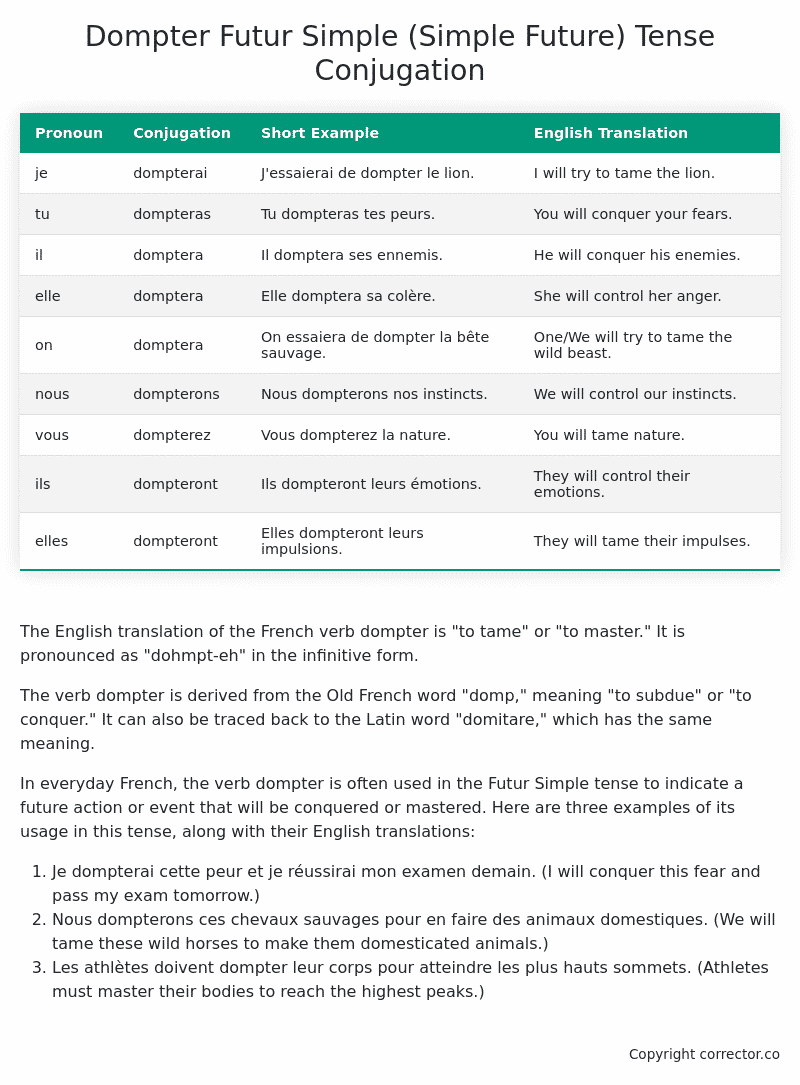Futur Simple (Simple Future) Tense Conjugation of the French Verb dompter
Introduction to the verb dompter
The English translation of the French verb dompter is “to tame” or “to master.” It is pronounced as “dohmpt-eh” in the infinitive form.
The verb dompter is derived from the Old French word “domp,” meaning “to subdue” or “to conquer.” It can also be traced back to the Latin word “domitare,” which has the same meaning.
In everyday French, the verb dompter is often used in the Futur Simple tense to indicate a future action or event that will be conquered or mastered. Here are three examples of its usage in this tense, along with their English translations:
- Je dompterai cette peur et je réussirai mon examen demain. (I will conquer this fear and pass my exam tomorrow.)
- Nous dompterons ces chevaux sauvages pour en faire des animaux domestiques. (We will tame these wild horses to make them domesticated animals.)
- Les athlètes doivent dompter leur corps pour atteindre les plus hauts sommets. (Athletes must master their bodies to reach the highest peaks.)
Table of the Futur Simple (Simple Future) Tense Conjugation of dompter
| Pronoun | Conjugation | Short Example | English Translation |
|---|---|---|---|
| je | dompterai | J’essaierai de dompter le lion. | I will try to tame the lion. |
| tu | dompteras | Tu dompteras tes peurs. | You will conquer your fears. |
| il | domptera | Il domptera ses ennemis. | He will conquer his enemies. |
| elle | domptera | Elle domptera sa colère. | She will control her anger. |
| on | domptera | On essaiera de dompter la bête sauvage. | One/We will try to tame the wild beast. |
| nous | dompterons | Nous dompterons nos instincts. | We will control our instincts. |
| vous | dompterez | Vous dompterez la nature. | You will tame nature. |
| ils | dompteront | Ils dompteront leurs émotions. | They will control their emotions. |
| elles | dompteront | Elles dompteront leurs impulsions. | They will tame their impulses. |
Other Conjugations for Dompter.
Le Present (Present Tense) Conjugation of the French Verb dompter
Imparfait (Imperfect) Tense Conjugation of the French Verb dompter
Passé Simple (Simple Past) Tense Conjugation of the French Verb dompter
Passé Composé (Present Perfect) Tense Conjugation of the French Verb dompter
Futur Simple (Simple Future) Tense Conjugation of the French Verb dompter (this article)
Futur Proche (Near Future) Tense Conjugation of the French Verb dompter
Plus-que-parfait (Pluperfect) Tense Conjugation of the French Verb dompter
Passé Antérieur (Past Anterior) Tense Conjugation of the French Verb dompter
Futur Antérieur (Future Anterior) Tense Conjugation of the French Verb dompter
Subjonctif Présent (Subjunctive Present) Tense Conjugation of the French Verb dompter
Subjonctif Passé (Subjunctive Past) Tense Conjugation of the French Verb dompter
Subjonctif Imparfait (Subjunctive Imperfect) Tense Conjugation of the French Verb dompter
Subjonctif Plus-que-parfait (Subjunctive Pluperfect) Tense Conjugation of the French Verb dompter
Conditionnel Présent (Conditional Present) Tense Conjugation of the French Verb dompter
Conditionnel Passé (Conditional Past) Tense Conjugation of the French Verb dompter
L’impératif Présent (Imperative Present) Tense Conjugation of the French Verb dompter
L’infinitif Présent (Infinitive Present) Tense Conjugation of the French Verb dompter
Struggling with French verbs or the language in general? Why not use our free French Grammar Checker – no registration required!
Get a FREE Download Study Sheet of this Conjugation 🔥
Simply right click the image below, click “save image” and get your free reference for the dompter Futur Simple tense conjugation!

Dompter – About the French Futur Simple (Simple Future) Tense
Formation of Futur Simple
For regular -er verbs (e.g., parler – to speak)
For regular -ir verbs (e.g., finir – to finish)
For regular -re verbs (e.g., vendre – to sell)
Common Everyday Usage Patterns
Conditional Statements
Interactions with Other Tenses
Futur Antérieur
Conditional
Present
Summary
I hope you enjoyed this article on the verb dompter. Still in a learning mood? Check out another TOTALLY random French verb conjugation!


